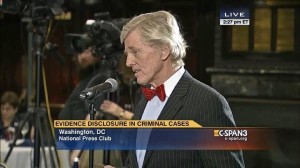Loudoun Circuit Court Judge Thomas D. Horne, as Chair of a “Special Committee on Criminal Discovery Rules,” sought to put a stop to prosecutors ambushing the Accused at trial and, even worse, from withholding evidence of innocence or wrongdoing cabined away by the prosecutor or by his investigators or witnesses; Judge Horne sought to bring “clarity and transparency” to the process.
Anybody who has suffered our criminal justice system knows that you get more information, by law, in a $500 bad debt civil case than if your freedom and reputation are on the line in a criminal case.
Judge Horne’s committee recommended reforms to the “system” to cure these defects. But the Supreme Court of Virginia accepted not one of the long needed reforms.
The best prosecutors in the Commonwealth and across the nation have an open file policy – meaning the Accused gets to see what’s in the prosecutor’s files – because these prosecutors believe their primary directive is to do justice, not to win at all costs.
When I was a federal and a state prosecutor we opened our case file because we knew an adversary for the Accused might see something we overlooked and, even when a witness might be at risk, we’d find a way to make critical information available.
It is an open secret that this nation’s dockets are awash in unjust convictions and too severe sentences because full and fair discovery of what the prosecution knows is withheld on a daily basis.
The most egregious prosecutorial lapses occur with information characterized as Brady, that is, evidence that contradicts the government’s charges, impeaches their witnesses, and mitigates against the more severe punishment the prosecutor is demanding.
US Chief Judge Alex Kozinski, from the Ninth Circuit federal appellate court, wrote in United States v. Olsen, 737 F. 3d 625 (9th Cir. 2013) – “[T] here is an epidemic of Brady violations abroad in the land.”
Judge Kozinski went further and said that there are too many “rogue investigators and forensic experts.” You’ve seen the reports of various federal and state labs impeached by bad practices and outright fraud including how the FBI estimated that over ten thousand cases going back to 1985 involved lab misconduct.
Vigilant defense attorneys tell Commonwealth prosecutors what they believe may fairly be characterized as Brady material but the prosecutors, all too often, are indifferent, annoyed even, harrumphing that they know their obligation, and insisting they have no such evidence – even when they most certainly do.
This is why Judge Kozinski wrote, “only judges can put a stop to [this]” – and he was talking about sanctions, and not just to bar the prosecution from using certain evidence at trial, but to impose discipline, fines and require restitution from the offending prosecutor.
Some prosecutors say they don’t know what their agents know – ostrich like. But the U.S. Supreme Court has said that they are obligated to find out what they know.
The ethics code requires prosecutors to make “timely disclosure” of all “evidence or information” that “tends to negate the guilt of the accused or mitigates the offense.”
The Commonwealth is further charged by the US Constitution with the responsibility of exercising reasonable diligence to confirm or deny what the Commonwealth’s agents, investigators or experts may know. See Kyles v. Whitley, 514 US 419 (1995).
The Virginia Supreme Court, however, said, in essence, that it would be a sweeping change, to make the system fair – to require the prosecutors to give up this information.
That’s a decision that must surely be reconsidered.


Judge Horne is stern but fair… great choice.